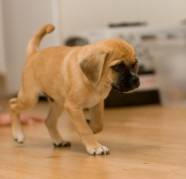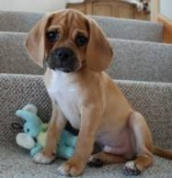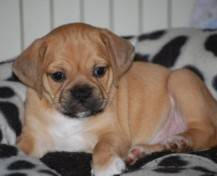



Copyright © 2022 Pugglesville. All rights reserved.
Housebreaking Rules
House Training Rule Number One: This is The Most Important Rule – If you don't catch your puppy doing
it - then don't punish him for it!
House Training Rule Number Two: Praise your puppy when things go right. Don't let this be a situation
where your only action is saying "No" when they are caught in the midst of using the wrong area. If they
do it right – let them know!
Methods of house training
Starting Inside: There are several ways to housebreak a puppy. With the first, you can put down papers or
pretreated pads, encouraging them to use these areas for going to the bathroom. The pads are scented
with a chemical that attracts the puppy to use them. Whenever you see them starting into their "pre-potty
pattern," such as walking around and sniffing the floor, you gently pick them up without talking and carry
them over to the papers/pad and then praise them when they go to the bathroom (Rule 2).
When all goes well and they are using the papers consistently, the papers are either moved closer to the
door and/or another set is placed outside. The transition is made from concentrating the toilet habits to
one spot inside the home to one spot outside the home. Finally, the papers inside are eliminated. The
only problem with this method is that for a period of time it encourages the animal to eliminate inside the
home. In our experience, house training may take longer when this method is used.
Crate Training: The second popular method of house training involves the use of a crate or cage. The
often-stated reasoning is that the animal is placed in a cage that is just large enough to be a bed. Dogs
do not like to soil their beds because they would be forced to lay in the mess. It
works, and while in these confines, most pups will control their bladder and
bowels for a longer time than we would expect. Young puppies, at 8 or
9 weeks of age can often last for 7 or 8 hours, however, we would
never recommend leaving them unattended in a crate for that long in
most circumstances.
During housebreaking, whenever the puppy is inside the home but
cannot be watched, he is placed in the crate. This might be while you
are cooking, reading to the children, or even away from the home. The
last thing you do before you put the puppy in the crate is take him
outside to his favorite spot. The first thing you do when you take the
animal out of the crate is another trip outside. No food or water goes in
the crate, just a blanket and maybe a chew toy to occupy his time. Overnight
is definitely crate time. As your faith in the puppy grows, leave him out for longer and
longer periods of time.
Most people do not recognize an important advantage of crate training. It does more than just stop the
animal from messing in the house. It also teaches the puppy something very important. The puppy learns
that when the urge to urinate or defecate occurs, he can hold it. Just because the pup feels like he needs
to relieve himself, the pup learns that he does not have to. This is thought to be the main reason why
puppies that have gone through crate training have fewer mistakes later on.
Make sure you buy the right size cage. You want one that has the floor space that provides just enough
for the puppy to lie down. But cages are useful throughout a dog's life and it would be nice if you did not
have to keep buying more as he grows. That is not necessary. Simply purchase a cage that will be big
enough for him as an adult, but choose a model that comes with or has a divider panel as an accessory.
With these, you can adjust the position of the panel so that the space inside the cage available to the pet
can grow as he does.
Using too large of a crate can often cause long term problems. The puppy will go to one corner of the
cage and urinate or defecate. After a while, he will then run through it tracking it all over the cage. If this is
allowed to continue, the instincts about not soiling his bed or lying in the mess will be forgotten and the
puppy will soon be doing it every day when placed in the crate. Now a house training method has turned
into a behavioral problem as the puppy’s newly-formed hygienic habits becomes his way of life.
Constant Supervision: The last method involves no papers, pads, or crates. Rather, you chose to spend
all the time necessary with the puppy. This works very well for people who live and work in their homes,
retired persons, or in situations where the owners are always with the animal. Whenever they see the
puppy doing his "pre-potty pattern" they hustle him outside. It is
important that the dog is watched at all times and that no mistakes are
allowed to occur. This method has less room for error, as there is
nothing like a cage to restrict the animal's urges, nor is there a place
for him to relieve himself such as on the papers or pad. When he is
taken outside, watch the puppy closely and as soon as all goes as
planned, he should be praised and then brought back inside
immediately. You want the dog to understand that the purpose for
going outside was to go to the bathroom. Do not start playing, make it
a trip for a reason. Verbal communications help this method and we
will discuss them soon. For those with the time, this is a good method.
We still recommend having a crate available as a backup when the
owners have to be away from the animal.
Verbal cues
Specific verbal communications will also help the two of you understand what is desired. It is an excellent
idea to always use a word when it is time to head to the bathroom. We like "Outside?" Remember that
whenever you use a verbal command or signal, it is important that everybody in the family always uses
the same word in the same way. Think of the word "Outside" in this situation not only as a question you
are asking the pup, but also as an indication that you want to go there. Some dogs may get into the habit
of going to the door when they want to go outside. This is great when it happens but it is not as common
as some believe. We have found that it is better to use verbal commands to initiate this sort of activity
rather than waiting for the puppy to learn this behavior on his own. It seems like your consistent use of a
word or phrase like "Outside" will cause the puppy to come to you rather than the door when he needs to
go outside. The pup quickly sees you as part of the overall activity of getting to where he needs to go. We
believe this is much better.
Once outside, we try to encourage the pup to get on with the act in question. We use the phrase "Do your
numbers." This is probably a holdover from our own parenthood and hearing children use the "Number 1"
or "Number 2" phrases. Others use 'Do It,' 'Potty,' or 'Hurry Up.' As soon as they eliminate, it is very
important to praise them with a "Good Dog" and then come back inside immediately. Again, make this trip
that started outside with a specific word "Outside" be for a purpose. If we are taking the pup out to play
with a ball or go for a walk we will not use this word even if we know they will eliminate while we are
outside.
When an 'accident' happens
One of the key issues in housebreaking is to follow Rule Number One: If you do not catch your puppy
doing it, then do not punish him for it! We do not care what someone else may tell you or what you read, if
you find a mess that was left when you were not there, clean it up and forget it.
Discipline will not help because unless you catch the puppy in the act, he will have no idea what the
scolding is for. Your puppy has urinated and defecated hundreds of times before he met you. Mom or the
breeder always cleaned it up. Nobody made a fuss before and the pup will not put the punishment,
regardless of its form, together with something he has done without incident numerous times before.
Especially if he did it more than 30 seconds ago! Puppies are just like
our children. Unless something was really fun (and a repetitious act like
going to the bathroom is not), they are not thinking about what they did
in the past. They are thinking about what they can do in the future. At
this point in his life a puppy's memory is very, very poor.
Anyway, let us face it. It was your fault, not the pup's. If you had been
watching, you would have noticed the puppy suddenly walking or
running around in circles with his nose down smelling for the perfect
spot to go to the bathroom. It is just as consistent as the taxi cab driver
behind you honking immediately when the light changes. The puppy will
show the same behavior every time. It may vary a little from pup to pup
but they always show their own "pre-potty pattern" before the act.
The same should be said as to your first reaction when you actually catch them in the act of urinating or
defecating. It is your fault, you were not watching for or paying attention to the signals. Do not get mad.
Quickly, but calmly pick them up and without raising your voice sternly say "No." Carry them outside or to
their papers. It will help to push their tail down while you are carrying them as this will often help them to
stop urinating or defecating any more.
They are going to be excited when you get them outside or to the papers, but stay there with them a while
and if they finish the job, reward them with simple praise like "Good Dog."
House Training Rule Number One: If you don't catch your puppy doing it, then don't punish him for it!
In the disciplining of dogs, just like in physics, every action has a reaction and for training purposes these
may not be beneficial! If you overreact and severely scold or scare the heck out of a puppy for making
what is in your mind a mistake, your training is probably going
backwards. With house training this is especially difficult for them
to understand as they are carrying out a natural body function.
Carried one step farther is the idea of rubbing a puppy's nose
into a mistake he made, whether you caught him or not. In the
limits of a puppy’s intelligence, please explain to us the
difference of rubbing his nose in his mess he left in your kitchen
an hour ago versus the one the neighbor's dog left in the park
two weeks ago. If the dog were smart enough to figure all of this
out, the only logical choice would be to permanently quit going to
the bathroom. Punishment rarely speeds up house training.
Often, it makes the dog nervous or afraid every time it needs to
go to the bathroom.
We will give you a perfect example of how this kind of disciplining causes long-term problems between a
dog and his owner. A client makes an appointment to discuss a housebreaking problem. They are hoping
that on physical exam or through some testing we can find a medical reason for the animal's inability to
successfully make it through housebreaking. They readily admit their frustration with the dog. The fecal
and urine tests reveal no problem. In the examination room, the pup is showing a lot more interest in the
veterinarian than he is in his owners. The animal's eyes are almost saying, "Please kidnap me from
them." When the owner reaches down to pet the dog on his head, the pup reflexively closes his eyes and
turns his head to the side. The dog reacts as if he were going to be hit. What this tells us is that the dog
has been punished for making messes in the owners' absence. During this punishment the puppy is not,
and we repeat, the puppy is not thinking about what he might have done two hours ago. He is not thinking
that he should not make messes in the house. The animal is not even thinking about the messes.
The classic line that usually goes with this scenario then comes up "When we get home we know he has
made a mess because he always sulks or runs and hides!" The dog is not thinking about some mistake
he may have made. Rather, the pup has learned that when the people first get home, for some reason he
has yet to figure out, they are always in a bad mood and he gets punished. The puppy has decided that
maybe he would be better to try to avoid them for awhile so he does try to hide. In this particular case,
discipline, misunderstood by the puppy, has caused him to fear his owners and this will probably affect
their relationship throughout the life of the dog.
If you want house training to go quickly, regardless of the method you use, spend as much time as
possible with your puppy. In an exam room, one of us once listened to a client complain about how he
had to take some time off from work for his own mental health and also, but unrelated, how the puppy
was not doing too well in the house training department. For us this statement was just too good to be
true. It was the perfect set-up for our pitch. This gentleman, a bachelor, truly loved his puppy. We saw
them together everywhere. Still, the problem was that he worked in a downtown office and the pup was
home. His work allowed him to get home frequently but not always
on a consistent schedule. There would be accidents when he was
gone and sometimes he was gone longer than the abilities or the
attention span of the puppy.
The solution was easy. We simply suggested his health and the
puppy's training would both do better if he stayed home for a week
or so. It worked. Under the man's watchful eye, he was always
there at the time when he was needed and in less than seven days
the ten-week-old puppy was trained. We are not saying there was
never another accident, but they were few and far between. In the
end, the best of all worlds occurred. The man realized his dog could be trusted, and thereafter, they spent
their days together at the man's office.
Feeding and house training
The feeding schedule you use can help or hinder housebreaking. You will soon notice that puppies will
need to go outside soon after they wake and also within 30 to 40 minutes after eating. Be consistent
when you feed the animal so you can predict when they need to relieve themselves. Plan your trips
outside around these patterns.
All of this may seem simple, and it really is. The keys are that it will take time and you must be consistent.
And, of course, you must never lose your temper or even get excited.
Spontaneous or submissive urination
Puppies may spontaneously urinate when excited. This may be when they first see you, at meeting a new
dog, or when they are scared. It is often referred to as submissive or excitement urination. Do not
discipline the puppy for this, as it is something they cannot control. Simply ignore it and clean up the
mess. If you do not overreact, they will usually outgrow this between 4 and 7 months of age.
Summary
Your new puppy is home and you have started the house training process. This is just as much a part of
training as the "Come" and "Stay" commands. However, mistakes that occur with house training can
cause more problems between you and your pet than those encountered with any other form of training.
Be patient and stay calm.
CLICK HERE TO DOWNLOAD THIS GUIDE AS A PDF
(RIGHT CLICK - SAVE TARGET/LINK AS
or CLICK THROUGH AND SAVE FROM VIEWER)
































HOME PUGGLE PUPPIES POCKET PUGGLES DAMS SIRES PUP'S LIFE ABOUT CONTACT ALBUM TESTIMONIALS 1
TESTIMONIALS 2 TESTIMONIALS 3 TESTIMONIALS 4 TESTIMONIALS 5 TESTIMONIALS 6 TESTIMONIALS 7 TESTIMONIALS 8
FAQ OPTIONAL HOUSEBREAKING
READY FEB 24TH
READY FEB 24TH


















































